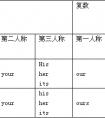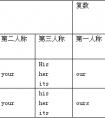根据要求改写句子。1. I often have lunch at school. (主语改为第三人称单数he) _____ often _____ lunch at school. 2. Carol likes skating. (改为否定句)Carol ___-七年级英语
It is never too old to learn.活到老,学到老。
It is no use crying over spilt milk.覆水难收。
It is the first step that costs troublesome.万事开头难。
It is the unforeseen that always happens.天有不测风云,人有旦夕祸福。
It is too late to grieve when the chance is past.坐失良机,后悔已迟。
It never rains but it pours.不鸣则已,一鸣惊人。
It takes three generations to make a gentleman.十年树木,百年树人。
Jack of all trades and master of none.门门精通,样样稀松。
Judge not from appearances.人不可貌相,海不可斗量。
Justice has long arms.天网恢恢,疏而不漏。
Keep good men company and you shall be of the number.近朱者赤,近墨者黑。
Kill two birds with one stone.一箭双雕。
Kings go mad, and the people suffer for it.君王发狂,百姓遭殃。
Kings have long arms.普天之下,莫非王土。
Knowledge is power.知识就是力量。
Knowledge makes humble, ignorance makes proud.博学使人谦逊,无知使人骄傲。
初中英语作文常用的谚语:
1.Practice makes perfect. 熟能生巧。
2.God helps those who help themselves. 天助自助者。
3.Easier said than done. 说起来容易做起来难。
4.Where there is a will,there is a way. 有志者事竟成。
5.One false step will make a great difference. 失之毫厘,谬之千里。
6.Slow and steady wins the race. 稳扎稳打无往而不胜。
7.A fall into the pit,a gain in your wit. 吃一堑,长一智。
8.Experience is the mother of wisdom. 实践出真知。
9.All work and no play makes jack a dull boy. 只工作不玩耍,聪明孩子也变傻。
10.Beauty without virtue is a rose without fragrance.无德之美犹如没有香味的玫瑰,徒有其表。
11.More hasty,less speed. 欲速则不达。
12.Its never too old to learn. 活到老,学到老。
13.All that glitters is not gold. 闪光的未必都是金子。
14.A journey of a thousand miles begins with a single step.千里之行始于足下。
15.Look before you leap. 三思而后行。
16.Rome was not built in a day. 伟业非一日之功。
17.Great minds think alike. 英雄所见略同。
18.well begun,half done. 好的开始等于成功的一半。
19.It is hard to please all. 众口难调。
20.Out of sight,out of mind. 眼不见,心不念。
21.Facts speak plainer than words. 事实胜于雄辩。
22.Call back white and white back. 颠倒黑白。
23.First things first. 凡事有轻重缓急。
24.Ill news travels fast. 坏事传千里。
25.A friend in need is a friend indeed. 患难见真情。
26.live not to eat,but eat to live. 活着不是为了吃饭,吃饭为了活着。
27.Action speaks louder than words. 行动胜过语言。
28.East or west,home is the best. 金窝银窝不如自家草窝。
29.Its not the gay coat that makes the gentleman. 君子在德不在衣。
30.Beauty will buy no beef. 漂亮不能当饭吃。
31.Like and like make good friends. 趣味相投。
32.The older, the wiser. 姜是老的辣。
33.Do as Romans do in Rome. 入乡随俗。
34.An idle youth,a needy age. 少壮不努力,老大徒伤悲。
35.As the tree,so the fruit. 种瓜得瓜,种豆得豆。
36.To live is to learn,to learnistobetterlive.活着为了学习,学习为了更好的活着。
37. Where there is a will, there is a way. 有志者事竟成。
38. Nothing is too difficult in the world if you set your mind into it. 世上无难事,只怕有心人。
39. Every coin has two sides. 每枚硬币都有两面;凡事皆有好坏。
40. Don‘t troubles trouble until trouble troubles you. 不要自找麻烦。
41. No pains,no gains. 不劳无获
考点名称:疑问代词
疑问代词:
疑问代词在句中起名词的作用,用来构成疑问句。常用的疑问代词有:
what, who, whose, whom, which, whatever, whichever, whoever, whomever
疑问代词在句中应位于谓语动词之前,没有词性和数的变化,除who之外也没有格的变化。
what, which, whose还可作限定词。
Whose books are these on the desk?
桌上的书是谁的?
What was the directional flow of U. S. territorial expansion?
美国的领土扩张是朝哪个方向的?
What events led to most of the east of the Mississippi River becoming part of the United States?
哪些事件使密西西比河以东的大部分土地归属于美国?
疑问代词在句中起名词词组的作用,用来构成疑问句。疑问代词有下列几个:
指 人: who, whom, whose
指 物: what
既可指人又可指物: which疑问代词说明:
一、无论是做疑问代词还是限定词,which 和 what 所指的范围不同。what所指的范围是无限的,而which则指在一定的范围内,例如:
Which girls do you like best?
你喜欢哪几个姑娘?
What girls do you like best?
你喜欢什么样的姑娘?二、Whom是who的宾格,在书面语中,它作动词宾语或介词宾语,在口语中作宾语时,可用who代替,但在介词后只能用whom, 例如:
Who(m) did you meet on the street?
你在街上遇到了谁?(作动词宾语)
Who(m) are you taking the book to?
你要把这书带给谁?(作介词宾语,置句首)
To whom did you speak on the campus?
你在校园里和谁讲话了?(作介词宾语,置介词 后,不能用who取代。)三、疑问代词用于对介词宾语提问时,过去的文体中介词和疑问代词通常一起放在句首,现代英语中,疑问代词在句首,介词在句未,例如:
For what do most people live and work?大部分人生活和工作的目的是什么?(旧文体)
What are you looking for?你在找什么?(现代英语)四、疑问代词还可引导名词性从句,例如:
I can't make out what he is driving at.
我不知道他用意何在。
Can you tell me whose is the blue shirt on the bed?
你能告诉我床上的蓝衬衣是谁的吗?
Much of what you say I agree with, but I cannot go all the way with you.
你说的我大部分同意,但并不完全赞同。- 疑问代词用法:
1. 疑问代词有who, whom, whose, which和what, 都是用来构成疑问句的:
Who is calling? 谁打电话来?
Whom do you want to speak to? 你想找谁接电话?
作主语时用who,作宾语时用whom,在口语中用who作宾语时也不少:
Who did you mean? 你指的是谁?
Who are you talking about? 你们在讲谁?
直接跟在介词后时只能用whom:
With whom did you come? 你和谁一道来的?
(口语中说“Who did you come with?时更多一些。)
2. 其他三个疑问代词可用作:
1)主语:
What’s your address? 你的地址怎样写?
Whose is better? 谁的好一些?
Which of these is yours? 哪一本是你的?
2)宾语:
What do you mean? 你是什么意思?
Which do you like better? 哪一个你更喜欢一些?
Whose have you chosen? 你选了谁的?
3)表语:
What’s her name? 她叫什么名字?
Whose is it? 这是谁的?
4)定语(这样用时有些字典标作形容词):
What time does the train leave? 这列火车什么时候离开?
Which room shall we stay in? 我们住哪间房?
Whose passport is this? 这是谁的护照?
考点名称:实义动词的单数第三人称形式
在一般现在时的肯定句中,当主语为非第三人称单数时,谓语动词用原形;
当主语为第三人称单数时,谓语动词用单数第三人称形式。- 实义动词的一般现在时的单数第三人称形式遵从“s,es, ies”六字母规则。如下表所示:

![Can you tellyour name?[ ]A. I B. meC. my D. mine-七年级英语](http://www.00-edu.com/d/file/ks/4/2/renchengdaici/2019-11-29/smallaa364e43e5a60c14a303f4c0130566e11575032405.png)


![_____ a cat. _____ name's Mimi. [ ]A. It's, It's B. Its, It's C. It's, ItsD. Its, Its -七年级英语](http://www.00-edu.com/d/file/ks/4/2/renchengdaici/2019-11-29/small3d77ed9f3a276fbdbe50d7d083528cb11575029994.jpg)
![Pu Cunxin is a good film star (电影明星). _____ is tall and he _____small eyes.[ ]A. His; hasB. He; hasC. He; isD. His; is-七年级英语](http://www.00-edu.com/d/file/ks/4/2/renchengdaici/2019-11-29/small1be6e01031d0d1da1dc8d9521925f3de1575032118.png)
